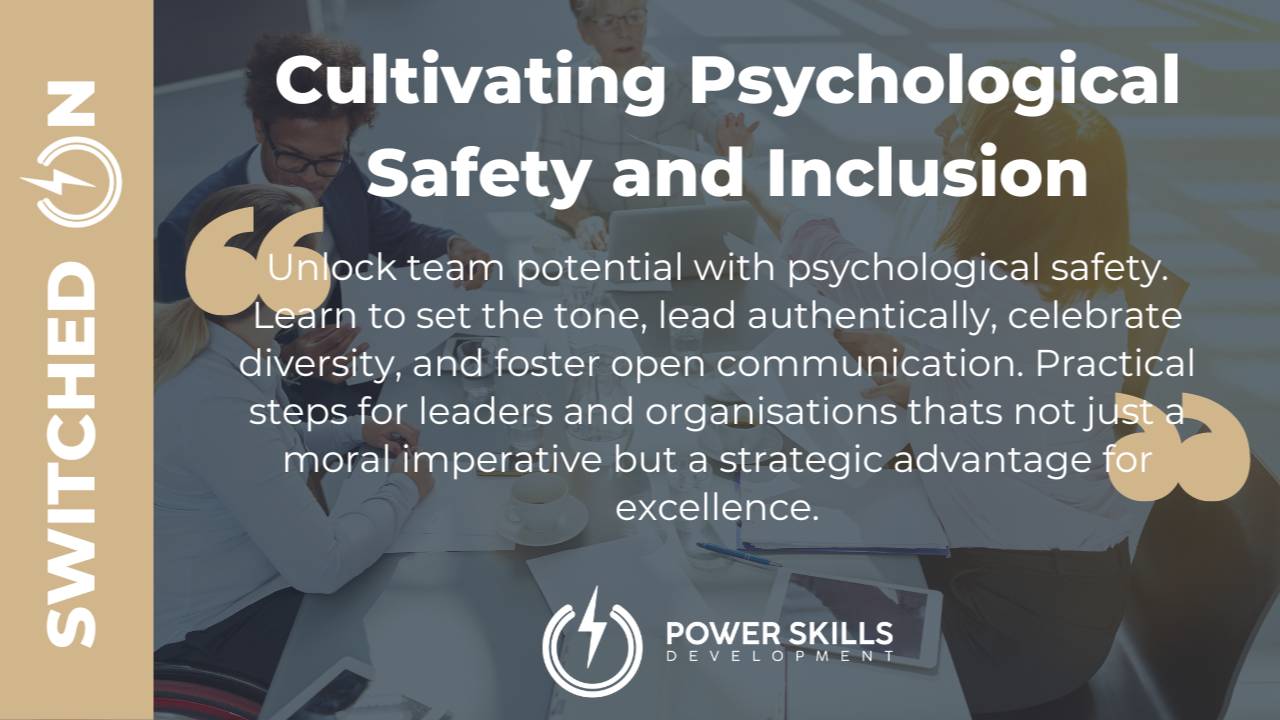Cultivating Psychological Safety and Inclusion in Your Teams
Jan 30, 2024
In today's rapidly evolving workplace, creating an environment of psychological safety and inclusion is crucial to the success of any team. The term "psychological safety" (coined by Amy Edmonton) refers to the ability of team members to express themselves openly without fear of reprisal, fostering an atmosphere where diverse perspectives are not only welcomed but celebrated.
Psychological safety is the foundation of high-performing teams. When individuals feel secure in sharing their thoughts, ideas, and concerns without the fear of judgment or negative consequences, it sets the stage for innovation, collaboration, and overall team success.
Amy Edmonton's work on Psychological Safety helps to illuminate the path towards creating teams that not only work together but truly thrive together. At its core, Amy's teachings remind us that every individual brings a unique brilliance to the team, and it's in embracing these differences that we find strength.
The Core of Psychological Safety and Inclusion
Embrace Authenticity:
Picture authenticity as the heartbeat of psychological safety. Leaders can invite participation by sharing their own challenges, acknowledging their imperfections and creating a space where showing up as your whole self is not a weakness but an opportunity for connection. It is important to note that this is not about unburdening yourself, but in sharing challenges or failures and what you learned, or what you are now committed to, as a leader you invite candour, shared learnings and experiences.
Celebrate Diversity:
Think of diversity as who you invite to the party, inclusion as who shows up, and belonging as who dances unashamedly. While many organisations focus on diversity (as a statistic) it is a single data point in time and without inclusion, it doesn't really matter all that much if you are unable to sustain any growth. It is important to actively seek out different perspectives, knowing that the kaleidoscope of ideas and experiences is what propels our teams towards innovation, improvement and ultimately success.
Building Blocks of Inclusivity
Open Communication:
Encourage open and honest dialogue within your team. Create forums or opportunities within meetings where team members can express themselves without fear of criticism, promoting a culture where every voice is heard and valued. I personally like to add a question at the end of my meetings "Is there anything we should have heard, but haven't yet?", this invites the people that may be waiting for that "right time" to put forward an idea, or challenge or different perspective, that may not have got there yet. When you first implement these opportunities, it is important to let your team know why you are doing it and what good looks like.
Lead by Example:
Leaders play a pivotal role in setting the tone. Demonstrate vulnerability, admit mistakes or failures, and showcase a willingness to learn and grow. This not only humanises leadership but also signals to the team that it's okay to be imperfect. We used to have a saying when I worked in innovation "A failure is really only a failure if you don't learn from it." Some of the most innovative companies in the world have a "failure of the month" wall as a way of removing the shame and sharing the learnings.
Diverse Perspectives:
Actively seek and celebrate diverse perspectives. Inclusion goes beyond representation—it's about ensuring that everyone feels their contributions are essential to team success. Embrace different backgrounds, experiences, and ways of thinking. Some of the best leaders I know don't hire in their likeness at all, in fact they do the opposite and hire people who have opposite and complimentary skills to them.
Feedback Culture:
Establish a constructive feedback culture. Encourage feedback not only from leaders to team members (and the reverse) but also among peers. This not only fosters growth but reinforces the idea that everyone's input is crucial. I worked with an executive who implemented this immediately into every one-on-one conversation by simply asking "do you have any feedback for me?" and got such value from being open to that additional input they shared the opportunity in a memo with the whole organisations leadership (over 700 people).
Practical Steps for Implementation
Training and Workshops:
Provide experiential training on psychological safety, diversity, equity, and inclusion. Workshops can create great awareness and help make it personal, challenge biases, and equip team members with the tools to cultivate a more inclusive environment.
Inclusive Policies:
Review and update policies to ensure they promote inclusivity. From recruitment practices to project assignments, assess and modify policies to eliminate any unintentional biases.
Regular Check-ins:
Conduct regular check-ins to assess the team's well-being. This could be through one-on-one meetings, toolbox talks, surveys, or informal gatherings. Pay attention to cues that may indicate discomfort or dissatisfaction.
Benefits of Psychological Safety and Inclusion
- Increased Innovation: Teams that feel safe to make mistakes are more likely to take calculated risks and explore innovative solutions.
- Higher Employee Satisfaction: Inclusive environments contribute to greater job satisfaction and overall well-being.
- Improved Problem Solving: Diverse perspectives lead to more comprehensive problem-solving approaches.
- Enhanced Collaboration: Team members who feel psychologically safe are more likely to collaborate effectively.
While it does take work, cultivating psychological safety and inclusion is not just a moral imperative for progressive organisations and leaders; it's a strategic advantage. It empowers teams to thrive in an ever-changing landscape and ensures that every member contributes their best. By fostering an environment where everyone feels valued, you're not just building a team – you're creating a culture of excellence.
Interested in learning more or seeking further support on how you can leverage this opportunity in your organisation?
Stay connected with news and updates!
Join our mailing list to receive the latest news and updates from our team.
We hate SPAM. We will never sell your information, for any reason. Unsubscribe at any time.

